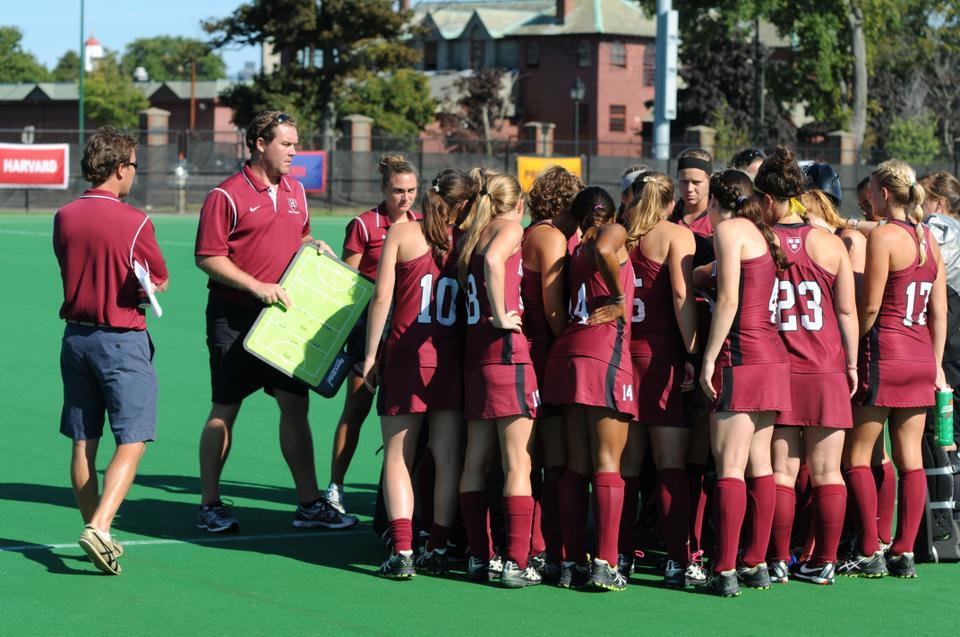
News
Progressive Labor Party Organizes Solidarity March With Harvard Yard Encampment

News
Encampment Protesters Briefly Raise 3 Palestinian Flags Over Harvard Yard

News
Mayor Wu Cancels Harvard Event After Affinity Groups Withdraw Over Emerson Encampment Police Response

News
Harvard Yard To Remain Indefinitely Closed Amid Encampment

News
HUPD Chief Says Harvard Yard Encampment is Peaceful, Defends Students’ Right to Protest
Van Herwaarden Takes Up the Reins as Field Hockey Head Coach

To many Americans, the phrase “typical hockey family” evokes images of snowy Minnesota winters, frozen-over ponds, and musty gym bags. When Tjerk van Herwaarden uses it, the new Harvard field hockey coach draws on a culture much more enamored with the sport played on grass than the one on ice.
Van Herwaarden’s voyage to Cambridge, Mass., spanned two continents and about 3,500 miles, with field hockey the one constant during his journey. Born in the Netherlands to a pair of field hockey-playing parents, he was given his first stick as an infant and recalls playing in youth leagues at the age of six.
As a teenager, van Herwaarden continued playing field hockey and began coaching youth leagues in his spare time. But at 21, an injury forced him to reevaluate his playing career and subsequently pushed him deeper into coaching over the next several years.
Still, his interest in the sport was just a hobby at the time; he was working concurrently as an investment banker at SNS Bank, a Dutch firm. Eventually, he reached a crossroads in his career: If he wanted to move up in either profession, he would have to make a choice between coaching field hockey and banking. His childhood passion won out.
Van Herwaarden had held a variety of different coaching positions in the Netherlands, working with two different club teams, the Dutch youth development program, and members of the Dutch national women’s team. He was also running his own business, Worldcamp USA, which put on field hockey clinics and camps in the United States.
It was on one such trip, this time for a coaching convention, that he met University of Maryland head coach Missy Meharg, who happened to be looking to fill a hole in her staff vacated by a departing assistant coach.
“She said, ‘Tjerk, are you interested?’” van Herwaarden said. “I was 28 years old, my last time to go on a little adventure. I told myself I’d do it for two years; that was seven or eight years ago now.”
For her part, Meharg recognized an innate feel for playing and teaching field hockey in van Herwaarden, a product of his childhood spent immersed in the sport.
“This is a guy who’s grown up with [field hockey] as an integral part of his system,” Meharg said. “He’s a natural hockey player, and in that regard, he understands the game.”
Van Herwaarden spent seven seasons as an assistant head coach with the Terrapins, a remarkable run that saw the team win four ACC titles and five national championships, even earning them two trips to the White House. Yet, with Meharg firmly established as the head of the program for the foreseeable future, van Herwaarden made another career move.
In the winter of 2011, Harvard’s athletic department chose not to renew the contract of former coach Sue Caples and offered van Herwaarden the job early in the summer of 2012. Meharg noted that it was a particularly good fit given van Herwaarden’s “intellectual” approach to the sport, and he jumped at the opportunity.
“After a while, [winning] doesn’t get old, but being an associate head coach and now having a chance to have your own program—after seven years, it’s a great time,” van Herwaarden said.
Van Herwaarden understands that he has a significant rebuilding project in front of him; the Crimson hasn’t had a winning season since 2004. And though he is committed to winning, he was able to remain philosophical about losses like his new team’s disappointing 2-1 double-overtime defeat at the hands of Sacred Heart on Sept. 3.
"The harder [the girls] work, the more luck they have,” van Herwaarden said. “The small little details will be controlling the outcome. We just have to change small pieces—going one-on-one with the goalkeeper, or one-on-one defense with no cover behind you—those are the little things, and we can practice that.”
The players have responded positively to van Herwaarden’s message of focusing on the particulars as a path to success.
“We know that good individual defense, good stick skills, and good scoring opportunities will turn into goals, and goals will turn into wins,” co-captain Cynthia Tassopoulos said. “[Van Herwaarden’s] going to push us to become winners and learn how to win the game, not just play for 70 minutes.”
Van Herwaarden’s plan to improve the program also includes gaining exposure against more talented opponents. In 2012, the Crimson is scheduled to play No. 14 Northeastern and No. 17 Boston College in non-conference play, in addition to No. 4 Princeton during the Ivy season.
“This team has already told me that they want to play a tougher schedule,” van Herwaarden said. “If you spend all this time being part of this team, why not get the best out of it? All the hours spent here, all the hours traveling, all the hours in games, taking away from everything else Harvard has to offer—it has to be worth something.”
—Staff writer Andrew R. Mooney can be reached at mooney@college.harvard.edu.
Want to keep up with breaking news? Subscribe to our email newsletter.
